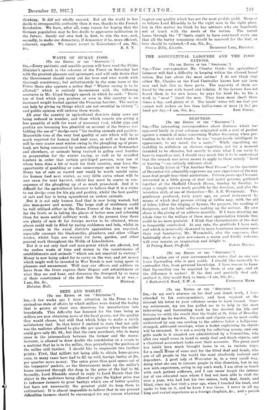BEER AND BARLEY.
(To THE EDITOR or THE SPECTATOR:1 Sle,—A few weeks ago I drew attention in the Press to the anomalous state of affairs by which millers were denied the barley that is grown at their own doorsteps for manufacture into breadstuff's. This difficulty has lessened for the time being as millers are now obtaining more of the local grown, not the quality they would choose, but still that which helps to make a fairly satisfactory loaf. In that letter I omitted to state that not only was the malteter allowed to give 88s. per quarter where the miller could give only 62s. 9d., but that the corn merchant, who in many cases is the intermediary between the farmer and the manu- facturer, is allowed to draw double the commission on a resale to a maltster that he is to the miller, thus prejudicing the position of the miller still further. I should like to emphasize two further points: First, that millers not being able to obtain home-grown corn, in many cases have had to fin up with foreign barley at its. per quarter more money. The extra price thus paid comes out of the taxpayers pockets, as the Government make up the miller's loam incurred through the drop in the price of the loaf to 9d. Secondly, Lord Rhondda stated in reply to Lord Harrill that the object in the maltsters being allowed to give the higher price was to influence farmers to'grow barleys which are of better quality but have not necessarily the greatest yield (to keep them in cultivation). It is almost impossible to-believe that in our present difficulties farmers ehenld be encouraged for any reason whatever to grow any quality which has not the moat prolific yield. Many of us believe Lord Rhondda to be the right men in the right place, but in this matter we think lie has advisers who are hopelessly out of touch with the needs of the nation. The recent losses through the 'U'-boats ought to have convinced every one that all the barley remaining should be reserved for the loaf, of Leer should be rationed.—I am, Sir, Ac.,


























 Previous page
Previous page